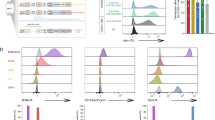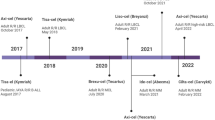Abstract.
CD20 is a B-cell-specific cell surface protein expressed on mature B lymphocytes and is a target for monoclonal antibody therapy for non-Hodgkin's lymphoma (NHL). Though clear clinical efficacy has been demonstrated with several anti-CD20 antibodies, the mechanisms by which the antibodies activate CD20 and kill cells remain unclear. Proposed mechanisms of action include complement-dependent cytotoxicity (CDC), antibody-dependent cell-mediated cytotoxicity (ADCC), and induction of apoptosis. In this report we compared the activity of two anti-CD20 antibodies, Anti-B1 Antibody (tositumomab) and rituximab (C2B8), in a variety of cellular assays using a panel of B-cell lines. Anti-B1 Antibody showed a low level of activity in a CDC assay against complement-sensitive B-cell lines, Ramos and Daudi. We found that there is an inverse correlation between the expression of CD55 and CD59 and CDC mediated by either Anti-B1 Antibody or rituximab. Rituximab was more potent at inducing CDC when compared to Anti-B1 Antibody. Using Raji cells as target cells and human peripheral blood leukocytes as effector cells, Anti-B1 Antibody was a potent inducer of ADCC. The activities of Anti-B1 Antibody and rituximab were nearly identical in the ADCC assay. In addition, Anti-B1 Antibody showed direct induction of apoptosis in all B-cell lines tested. In general, crosslinking Anti-B1 Antibody with a goat anti-mouse Ig did not further enhance the percentage of cells undergoing apoptosis. Importantly, a F(ab')2 fragment of Anti-B1 Antibody induced apoptosis, while the Fab fragment did not, indicating that the Fc region was not required and dimerization of CD20 may be sufficient for induction of apoptosis. In contrast, rituximab, which binds to an overlapping epitope on CD20 with a three-fold lower affinity than Anti-B1 Antibody, did not efficiently induce apoptosis in the cell lines tested in the absence of crosslinking. In conclusion, these two anti-CD20 antibodies have overlapping, but distinct mechanisms of action on B-cell lines.
Similar content being viewed by others
Author information
Authors and Affiliations
Additional information
Electronic Publication
Rights and permissions
About this article
Cite this article
Cardarelli, P.M., Quinn, M., Buckman, D. et al. Binding to CD20 by Anti-B1 Antibody or F(ab')2 is sufficient for induction of apoptosis in B-cell lines. Cancer Immunol Immunother 51, 15–24 (2002). https://doi.org/10.1007/s00262-001-0247-1
Received:
Accepted:
Issue Date:
DOI: https://doi.org/10.1007/s00262-001-0247-1




